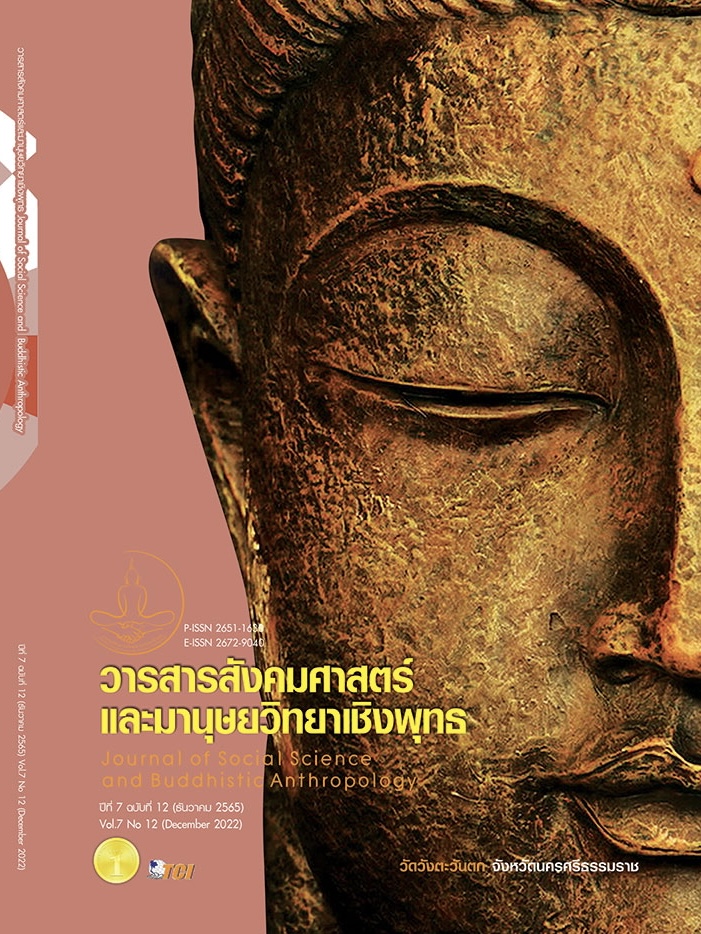A MANAGEMENT MODEL IN ENHANCE TEACHER DEVELOPMENT IN PROJECT-BASED LEARNING MANAGEMENT FOR BANPAYAENG SCHOOL UNDER THE CHIANG RAI PRIMARY EDUCATIONAL SERVICE AREA OFFICE 1
Keywords:
Management Model, Project-Bases Learning Management, Teacher DevelopmentAbstract
The objective of this research article was to develop the management model in enhance teacher development in project-based learning management for Banpayeang School. This study used research and development method, as follows: Step 1, basic information study that data were collected via literature reviewing, focus group discussion and semi-interview. Step 2, development the model by drafting and doing connoisseurship by scholar experts. Step 3, implementation the model by 42 teachers that were voluntary selection from 9 schools. Step 4, evaluation the model by 42 teachers. The research tools were a form containing issues for semi-interview, focus group discussion, questionnaires, evaluation form. Research data were percentage, mean, standard deviation, analyzed with content analysis in order to synthesize to derive at conclusions. The findings showed that 1) The guidelines for teacher development were to build teachers participating network for project-based learning management including doing, reflecting and follow up continuously. 2) The management model in enhance teacher development in project - based learning management for Banpayeang School consist of six major components: principles, objectives, content, process, measurement and evaluation, key success factor. The 6 steps of the model process consist of 1) Building teacher network, 2) Analyze and making agreement, 3) Design and planning, 4) Implementation 5) Follow - up and reflection, and 6) Evaluation. 3) The results of model implementation was teachers were able to write lesson plan at a high level, teaching in project-based learning management was at a very good level, and their overall attitude towards project-based learning management was at a strongly agree level. 4) The result of the model evaluation showed that the utility, feasibility, propriety standard of the model in overall was at the highest level ( = 4.65, S.D. 0.20)
References
กุลิสรา จิตชญาวิณิช. (2562). การจัดการเรียนรู้. (พิมพ์ครั้งที่ 1). กรุงเทพมหานคร: สำนักพิมพ์จุฬาลงกรณ์มหาวิทยาลัย.
เกียรติศักดิ์ สุทธิ และคณะ. (2563). รูปแบบการพัฒนาครูในการจัดการเรียนรู้แบบพึ่งตนเองของนักเรียนตามหลักปรัชญาของเศรษฐกิจพอเพียง โรงเรียนวัดกู่สามัคคี สำนักงานเขตพื้นที่การศึกษาประถมศึกษานครราชสีมาเขต 6. วารสารสังคมศาสตร์และมานุษยวิทยาเชิงพุทธ, 5(6), 261-274.
จอมพงศ์ มงคลวนิช. (2556). การบริหารองค์การและบุคลากรทางการศึกษา. (พิมพ์ครั้งที่ 2). กรุงเทพมหานคร: วี.พริ้นท์ (1991).
ชญาพิมพ์ อุสาโห และคณะ. (2562). การพัฒนากระบวนทัศน์ รูปแบบและกลไกการพัฒนาครูในลักษณะเครือข่ายเชิงพื้นที่ 5 พื้นที่. กรุงเทพมหานคร: สำนักงานเลขาธิการสภาการศึกษา.
ชนันภรณ์ อารีกุล. (2563). การศึกษาและการเรียนรู้ตลอดชีวิต: แนวคิด หลักการ และสาระสำคัญ. กรุงเทพมหานคร: สำนักพิมพ์จุฬาลงกรณ์มหาวิทยาลัย.
ชัยวัฒน์ สุทธิรัตน์. (2558). 80 นวัตกรรมการจัดการเรียนรู้ที่เน้นผู้เรียนเป็นสำคัญ. (พิมพ์ครั้งที่ 6). กรุงเทพมหานคร: พี บาลานซ์ดีไซด์แอนปริ้นติ้ง.
โชติชวัล ฟูกิจกาญจน์. (2556). กระบวนการพัฒนาทรัพยากรมนุษย์เชิงกลยุทธ์. วารสารมนุษยศาสตร์และสังคมศาสตร์, 4(1), 33-45.
ทิศนา แขมมณี. (2558). ศาสตร์การสอน: องค์ความรู้เพื่อการจัดกระบวนการเรียนรู้ที่มีประสิทธิภาพ. (พิมพ์ครั้งที่ 19). กรุงเทพมหานคร: ด่านสุทธา.
ธีรศักดิ์ อุปรมัย และคณะ. (2563). การบริหารและการจัดการศึกษาสู่การพัฒนาที่ยั่งยืน. พิษณุโลก: สำนักพิมพ์มหาวิทยาลัยนเรศวร.
ปริยาภรณ์ ตั้งคุณานันต์. (2561). ความเป็นครูมืออาชีพ. กรุงเทพมหานคร: มีน เซอร์วิส ซัพพลาย.
พรรณอร อุชุภาพ. (2561). การศึกษาและวิชาชีพครู. กรุงเทพมหานคร: โรงพิมพ์แห่งจุฬาลงกรณ์มหาวิทยาลัย.
พศิน แตงจวง. (2554). รูปแบบการพัฒนาสมรรถนะบุคลากรทางการศึกษา. กรุงเทพมหานคร: ดวงกมล.
รุ่งชัชดาพร เวหะชาติ. (2556). การบริหารจัดการสถานศึกษาขั้นพื้นฐาน. (พิมพ์ครั้งที่ 5). สงขลา: นำศิลป์โฆษณา.
โรงเรียนบ้านป่าแหย่ง. (2562). ผลการนิเทศภายในโรงเรียนบ้านป่าแหย่ง ปีการศึกษา 2561-2562. เชียงราย: โรงเรียนบ้านป่าแหย่ง.
สนธยา พลศรี. (2550). เครือข่ายการเรียนรู้ในงานพัฒนาชุมชน. กรุงเทพมหานคร: โอ.เอส.พริ้นติ้ง เฮ้าส์.
สำนักงานคณะกรรมการการศึกษาขั้นพื้นฐาน. (2562). นโยบายสำนักงานคณะกรรมการการศึกษาขั้นพื้นฐาน ปีงบประมาณ พ.ศ.2563. กรุงเทพมหานคร: สำนักงานคณะกรรมการการศึกษาขั้นพื้นฐาน.
สิทธิพล อาจอินทร์. (2562). ศาสตร์และศิลป์การจัดการเรียนรู้ในศตวรรษที่ 21. (พิมพ์ครั้งที่ 2). ขอนแก่น: โรงพิมพ์มหาวิทยาลัยขอนแก่น.
สืบสกุล นรินทรางกูร ณ อยุธยา. (2563). การบริหารทรัพยากรมนุษย์ทางการศึกษาแนวใหม่. กรุงเทพมหานคร: จุฬาลงกรณ์มหาวิทยาลัย.
สุคนธ์ สินธพานนท์. (2558). การจัดการเรียนรู้ของครูยุคใหม่เพื่อพัฒนาทักษะของผู้เรียนในศตวรรษที่ 21. กรุงเทพมหานคร: 9119 เทคนิคพริ้นติ้ง.
อรชร ปราจันทร์ และสุกัญญา แช่มช้อย. (2561). รูปแบบการบริหารเพื่อพัฒนาทักษะการคิดเชิงนวัตกรรมของครูในสถานศึกษาขั้นพื้นฐาน. วารสารวิชาการมหาวิทยาลัยฟาร์อีสเทอร์น, 12(1), 156-169.
Knowles, M. S. (1980). The Modern Practice of Adult Education. New York: Cambridge.
Kolb, D. A. (1984). Experiential Learning. New Jersey: Prentice Hall.
Marquardt, M. J. (1996). Building the Learning Organization: A Systems Approach to. In Quantum Improvement and Global Success. McGraw-Hill.
Marquardt, M. J. (2002). Building the Learning Organization: Mastering the 5 Elements for Corporate Learning. California: Davies-Black.
Marsick, V. J., & Watkins, K. E. (1993). Sculpting the Learning Organization: Lessons in the Art and Science of Systemic Change. San Francisco: Jossey-Bass.
Mosun, M. E. (2018). Learning and Leading Collaboratively: A Study of Intermediate Teachers Engaged in Project Based Learning in Three Elementary Schools. In Doctoral dissertation, Ed.D. University of Toronto, Toronto.
Swanson, R. A. & Holton III, E. F. (2001). Foundations of Human Research Development. San Francisco: Berrett-Koehler.
Young, T. L. . (2018). Transformative Professional Development: A Narrative Approach Examining Teachers’ Implementation of Project Based Learning. In Doctoral dissertation, Ed.D. Northeastern University, Boston, Massachusetts.
Downloads
Published
How to Cite
Issue
Section
License

This work is licensed under a Creative Commons Attribution-NonCommercial-NoDerivatives 4.0 International License.









